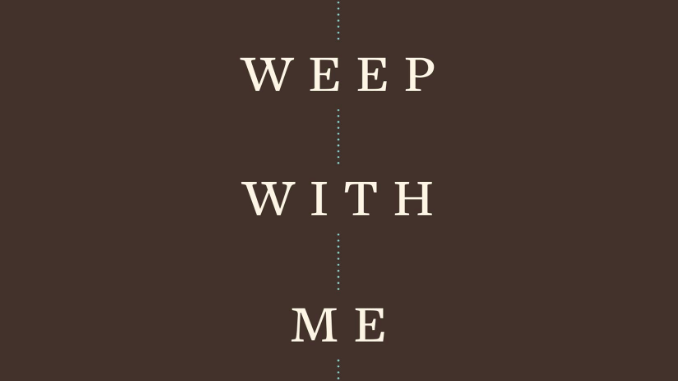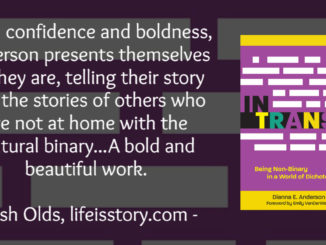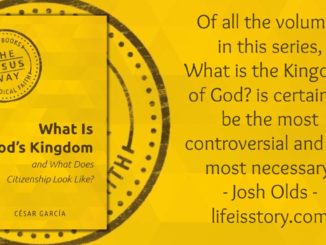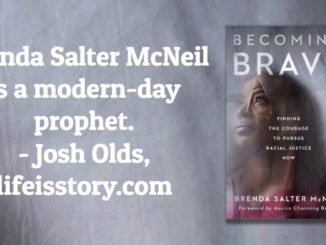
Published by Crossway Books on July 14, 2020
Genres: Non-Fiction, Christian Life, Racial Reconciliation, Theology
Buy on Amazon
Goodreads

Gospel unity creates racial harmony.
However, Martin Luther King Jr. once said that the most segregated hour in America is eleven o'clock on Sunday morning. Equipped with the gospel, the church should be the catalyst for reconciliation, yet it continues to ignore immense pain and division.
In an effort to bridge the canyon of misunderstanding, insensitivity, and hurt, Mark Vroegop writes about the practice of lament, which he defines as "the biblical language of empathy and exile, perseverance and protest." Encouraging you to "weep with those who weep" (Rom. 12:15), Vroegop invites you to mourn with him over the brokenness that has caused division and to use lament to begin the journey toward a diverse and united church.
Features Prayers of Lament From: Thabiti Anyabwile, Trillia Newbell, Jarvis Williams, John Onwuchekwa, Collin Hansen, Isaac Adams, Danny Akin, Mika Edmondson, Jason Meyer, & Garrett Kell.
In Weep with Me: How Lament Opens a Door for Racial Reconciliation, white pastor Mark Vroegop shares what he has learned from his church about how to have conversations across lines of difference without suspicion or hostility. Even though he repeatedly reinforces that lamenting together is only a first step, and not where the journey towards justice should end, he explains that when Christians of different races are able to express corporate prayers of lament, brothers and sisters in Christ have new windows into each other’s hearts and can better understand and feel the different shades of pain and confusion that people are walking through. Vroegop has previously written a general book about lament, and here, he specifically applies the concept to race. He explains what biblical lament looks like with reference to the psalms, and shares personal stories about how these heartfelt prayers can break down barriers.
The Power of Lament
He writes about a Civil Rights vision trip that his church took, expressing that despite all the tension and nervousness that members of both the majority and minority races felt, they were able to process their different responses through prayers of lament and found that this experience knit them together into closer relationships. Vroegop shares examples of some of these laments, and at the end of each chapter, he also shares a lament prayer written by another Christian leader. These prayers convey perspectives from both men and women of different races, and add to the texture of this book while also supporting its message. He also writes about the power of African-American spirituals as examples of lament.
Vroegop provides an encouraging picture of how Christians can engage with one another in brotherly love, express their different forms of grief or repentance, and begin to work together to seek justice. He writes several chapters directly to fellow white people, and I found his chapter on the differences between repentance and remorse particularly clear and helpful, since he made it clear that people do not have to “repent” for ancestral sins that they have never committed, but should and must express remorse over them, instead of being defensive. In another section, he writes about how white people can identify and overcome the different roadblocks that keep them from engaging about race, and he addresses this in a way that respects the nuance and variance of different people’s backgrounds and experiences, instead of judging everyone’s motives or assuming that everyone is the same.
Speaking Out Despite Hurt
Vroegop also writes chapters that are specifically addressed to minorities. This book primary focuses on white and black reconciliation, since that is where his pastoral experience lies, but he also acknowledges the experiences of other racial minorities and the challenges that they face within America and the racially and culturally white church. He writes about how, in most cases, minority church members are already lamenting, but should continue to “honestly express pain and loving protest the brokenness in the world.” He encourages them to not give up, despite their wounds and frustrations, and grounds this in a biblical perspective on God’s love and justice for the oppressed. He also shares stories about minority members in his church who have made a difference through faithfully speaking out, despite the hurt and dismissal that they sometimes experienced.
Although Vroegop emphasizes that empathy and lament are only first steps towards a longer, more complex journey, he provides a powerful picture of how Christians can grow in understanding and love by being vulnerable and honest in corporate prayer. He encourages both majority and minority race believers to pray for justice, weep with those who weep, and listen in ways that lead to growth and change, rather than engaging with others out of a posture of defensiveness and anger. Although this perspective might seem useless to someone outside of the church, Vroegop is confident from Scripture and experiences within his own church that lament and Christlike love can open the door to deep renewal and change.
Conclusion | Weep With Me
This book is great for people who are just beginning to think and talk about race, and it is also helpful for those who have been wrestling with these issues long-term. Vroegop writes in an accessible and loving way, and unlike many other authors, he does not require a reader to swallow his entire political philosophy in order to engage with his work. Of course, issues of public policy are important, but Vroegop starts with the heart of the matter, helping people adopt habits of empathy, lament, and humble listening before they try to work through their disagreements about what holistic justice should look like in our political, economic, and social systems. This is a great book for people of different races who want to think through the power of lament to help bring understanding and healing, and Vroegop’s approach does nothing to get in the way of that process.



